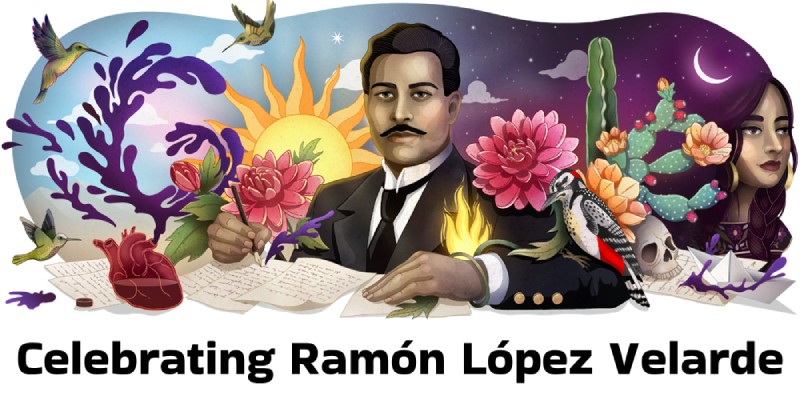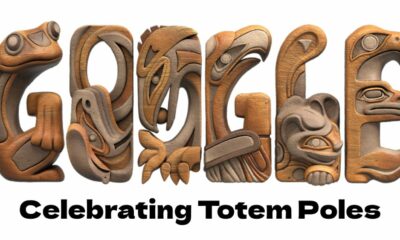Festivals & Events
Google Doodle Celebrates Mexican Poet Ramón López Velarde

Today’s Google Doodle honors renowned Mexican poet Ramón López Velarde on July 27, 2023, as illustrated by Mexico-based guest artist Ale De la Torre. For his postmodern, French-influenced writing, López Velarde is regarded as the founder of Modern Mexican poetry and the country of Mexico’s national poet. The final issue of Pegaso, the magazine Ramón co-founded, was published in Mexico on this day in 1917.
Mexican poet Ramón López Velarde was born. His work was a response to modernismo, which had French influences, and it is distinctive because it expresses purely Mexican subject matter and emotional experience. He rose to prominence in his home country and is now regarded as Mexico’s national poet.
On June 15, 1888, Ramón López Velarde was born in Jerez, Zacatecas. He studied law at the University of San Luis Potos, following in his father’s footsteps, and began reading modernist poetry in high school. He graduated from law school in 1911, but his career took a different turn. He received an invitation to contribute to La Nación, a monthly publication in Mexico City.
Ramón López Velarde started writing more personal poems in 1915, mainly about the nostalgia he felt about his hometown. The next year, López Velarde published his first book, La Sangre Devota (The Pious Blood), which contrasts life in the busy metropolis and the peaceful countryside. The literary community in Mexico thoroughly celebrated it, and it opened the door for more poetic opportunities.
Zozobra, his most famous work, was released in 1919. The book contains a lot of irony and reflects the duality in a number of aspects of López Velarde’s life. The unpredictability, unconventional vocabulary, word games, and hilarious rhymes of the text are applauded. He began contributing to the journals México Moderno and El Maestro in 1920, following a significant change in the course of Mexico’s government. The latter contained his most famous work, La Suave Patria, which solidified him as the country’s national poet.
Ramón López Velarde was a journalist, a law student, and a government employee. The simplicity of rural life, the conflict between sensuality and spirituality, and the poet’s love for his cousin Fuensanta (Josefa de los Ríos) are all topics covered in his first collection of poems, La sangre devota (1916; “Devout Blood”). The language is frequently intricate and full of adventurous imagery. The topics of his earlier work are handled more intensely in Zozobra (1919; “Anguish”).
The poems’ depictions of intense sensuality and the associated feelings of loss and agony were inspired by Fuensanta’s death in 1917. The poetry that López Velarde had not yet published were collected in “The Sound of the Heart” (1932).
Despite the fact that Ramón López Velarde’s poetry was not appreciated when he was alive, he eventually came to be regarded as one of the best Mexican poets of all time. There is no denying his impact on Mexico’s avant-garde poets. El Minutero (1933; “The Minute Hand”), El don de febrero (1952; “The Gift of February”), and Prosa Poltica (1953; “Political Prose”) are essay collections by him that, in a highly lyrical manner, deal with some of the same themes as his poetry.
-

 Sports4 weeks ago
Sports4 weeks agoAl Ahly vs Inter Miami, 2025 FIFA Club World Cup – Preview, Prediction, Predicted Lineups and How to Watch
-
Health3 weeks ago
Back to Roots: Ayurveda Offers Natural Cure for Common Hair Woes
-

 Tech3 weeks ago
Tech3 weeks agoFrom Soil to Silicon: The Rise of Agriculture AI and Drone Innovations in 2025
-

 Startup4 weeks ago
Startup4 weeks agoHow Instagram Is Driving Global Social Media Marketing Trends
-

 Sports3 weeks ago
Sports3 weeks agoFIBA 3×3 World Cup 2025: Full Schedule, Preview, and How to Watch
-

 Science4 days ago
Science4 days agoJuly Full Moon 2025: Everything You Should Need to Know, When and Where to See Buck Moon
-

 Gadget3 weeks ago
Gadget3 weeks agoThings to Know about Samsung Galaxy S26: What’s New and What’s Next
-

 Sports4 weeks ago
Sports4 weeks agoWorld Judo Championships 2025: Full Schedule, Date, Time, Key Athletes and How to Watch

























